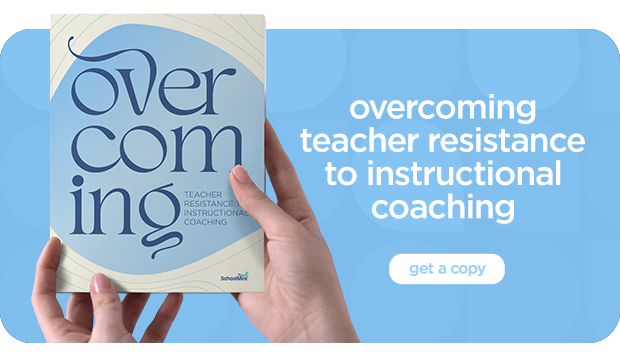Tips for Administrators: How to Effectively Communicate with Teachers
Communication: when done right, we learn, collaborate, and use that knowledge to further the interests of the group as a whole. When done wrong, communication leads to confusion, frustration, decreased morale, and a general breakdown in the flow of ideas.
For school leaders, good communication skills are crucial and lead to a positive environment where everyone feels heard and supported.
However, schools suffering from poor leadership communication leave staff at a disadvantage, leading to a negative work environment — an environment that’s ripe for attrition.
So how can you, as a school leader, create a culture of feedback and interact with teachers in a more effective manner?
Here are some tips that’ll get you on the path to clear communication — or simply strengthen your existing skills.
Communication Tip #1: Evaluate Yourself
Take a look at your existing communication skills and where they stand.
Throughout one school week, or even just one full day, keep track of everyone you come in contact with during the day. This includes texts, emails, bulletins, newsletters, hand signals, or even smoke signals.
Take notes not only on who you communicated with but also what the subject matter was, how you believe you communicated yourself, what your takeaway from the encounter was in each case, and how that interaction affected your relationship with that person.
Then do some analysis. Take a look at the information you’ve compiled. See if there are any recurring themes that show up in your communications. Is there anything you can improve on or change altogether?
A teacher coaching, feedback, and observation platform like SchoolMint Grow can help you with recording and noting down your interactions with teachers. Plus, it has built-in data reporting, so you can easily identify trends and measure growth across your school/district.
Communication Tip #2: Get Feedback from Others
Ask teachers to email you with their thoughts, or let them know they can stop by your office, either during predetermined office hours or whenever they have a moment. Keeping an open-door policy is a great way to get feedback. But make sure teachers actually feel comfortable enough to use it.
If you say your door is always open, but your actions scream UNAVAILABLE, DON’T BOTHER ME, I’M BUSY — or if teachers fear being penalized for speaking their mind — you won’t receive any benefit from maintaining this policy. You may as well close the metaphorical door.
Also, ask team leaders to evaluate you a few times a year, and use their feedback wisely. Don’t just get it and forget it. Listen, receive feedback graciously, express your appreciation (since you know that means they care), and consider it thoughtfully. And act upon actionable, valuable insights.
If you’re finding it difficult to gather feedback, consider sending out short, anonymous surveys, asking teachers to honestly describe your performance. Google Forms and SurveyMonkey are great tools for this.
Even if you don’t agree with the feedback you’re getting, let the person giving it know their opinion matters and you’ve taken it into account. If there’s something they’re wrong about, use it as an opportunity to note gaps in your communication and fix misunderstandings.
Communication Tip #3: Maintain Open Lines of Communication
When introducing a new policy or initiative, do your best to make teachers feel included — yes, even if it’s something mandatory.
Remember when your parents asked you to do something that seemed completely arbitrary or incredibly unpleasant as a kid? You’d ask why and the response was too often “Because I said so!”
…yeah, remember how maddening that was?
That same dynamic can play out with school leadership, leaving teachers feeling unimportant or disgruntled.
Make sure you explain things to your teachers, letting them know why you’re making changes, the effects these changes will have on them, and what you hope to see in your school (and in student achievement!).
Maintaining open lines of communication involves honing your listening skills. When you talk or meet with teachers, think to yourself, “What’s the dynamic?” Are you giving information — or marching orders? Are you allowing for two-way communication?
Try to approach conversations from the perspective of “What can I learn from this?”
Communication Tip #4: Listen to Your Teachers
You hired them for a good reason. They know what they’re talking about and can help you learn, too.
- If they’re doing something right, make sure to praise them and let them know you appreciate them. (Remember how I mentioned SchoolMint Grow earlier? It can help you leave this positive feedback!)
- If they’re doing something wrong, let them know kindly and constructively — in a way you’d like to hear feedback yourself.
- If a teacher simply isn’t open to communication/constructive criticism, then maybe it’s time to consider whether that teacher is a good fit for your school or to explore strategies for helping them realize that feedback is a gift.
Communication Tip #5: Ask Questions
Ask for clarification if you need it. Ask how their classes are going. Ask if there’s anything they need. Sometimes, teachers can be afraid or unaccustomed to asking for help — so do your part by making it easier for them to get the support they need.
At the same time, pay attention to your non-verbal communication. What are you saying with your body language? For example:
- Are you crossing your arms, giving the impression you’re closed off and not accepting input?
- Are you nervous and hesitant? Or warm and welcoming?
- Are you meeting their eyes?
- Are you making them feel comfortable and heard?
- Are you giving them your full attention?
One great way to practice listening better is to make it a point to turn off technology when teachers come talk with you. They’ll appreciate the gesture you made, and you’ll have fewer chances to miss out on what they want to discuss.
Make your teachers feel valued, and let them feel they have a voice in creating and implementing positive change. This feeling of ownership will lead to their support, along with strengthening your teacher–administrator relationships.
Communication Tip #6: Be Trustworthy
In education, things are constantly in flux. Having a team that trusts you is key when it comes to implementing changes and keeping your school running smoothly.
If teachers feel you aren’t doing right by them, the school, or the students, it lowers their motivation to do the right thing, too.
If, for example, your school doesn’t have the resources to help teachers do their jobs properly, make sure your staff trusts you’re pulling every last string you can find to help create a better work environment and drum up resources however you can.
There are many other things you can do to practice good communication with your teachers. I’ve listed just a few you can begin with.
If you’ve got all that down and are ready to take the next step, let’s get in touch about SchoolMint Grow and discuss how it can improve your efforts to better support your teachers!
Click the image below to request a free demo of the platform for yourself.
Share this
You May Also Like
These Related Stories

Using SchoolMint Grow for Teacher Coaching in Your School




